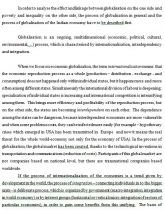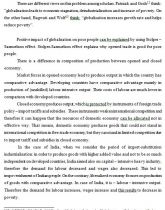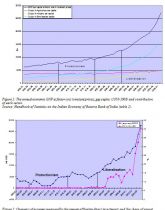Hľadaj
Zobraz:
Univerzity
Kategórie
Rozšírené vyhľadávanie
45 171
projektov
Home » Bakalárska práca » EMPIRICS OF GLOBALISATION - GLOBALISATION AND ITS IMPACT ON POVERTY AND INEQUALITY IN INDIA
EMPIRICS OF GLOBALISATION - GLOBALISATION AND ITS IMPACT ON POVERTY AND INEQUALITY IN INDIA
| Prípona .doc |
Typ bakalárska práca |
Stiahnuté 4 x |
| Veľkosť 0,1 MB |
Jazyk anglický |
ID projektu 12671 |
| Posledná úprava 11.08.2020 |
Zobrazené 1 405 x |
Autor: - |
 Zdieľaj na Facebooku
Zdieľaj na Facebooku |
||
| Detaily projektu | ||
- cena:
5 Kreditov - kvalita:
88,2% -
Stiahni
- Pridaj na porovnanie
- Univerzita:Ekonomická univerzita v Bratislave
- Fakulta:Fakulta medzinárodných vzťahov
- Kategória:Ekonomika » Ekonómia
- Predmet:-
- Študijný program:-
- Ročník:3. ročník
- Formát:MS Office Word (.doc)
- Rozsah A4:23 strán
This paper is about the impacts of globalisation on poverty and inequality in India. I decided to choose India, because during its history, it has realized two different types of economic policy: interventionist economic policy (1965-1981) and economic policy of liberalisation (1991-). The first one resulted to inward-looking protectionism, the second one to open trade policy, which has accelerated the process of globalisation of Indian economy in to the world economy. This process offers possibilities to compare impacts of these types of policies on poverty and inequality.
The first part is about characteristic features of globalisation process in general. Globalisation process in the world has been accelerated from 1980s due to trade liberalisation. Using the arguments from the Theory of Comparative Advantages and this part is trying to explain, why is open trade policy good for the economic growth in comparison with protectionism.
In the second part, I focused on relation between poverty and globalisation. To explain, that globalisation has positive affect on poverty is used the Theory of Stolper -Samuelson effect. However, some scholars criticize this theory and believe that globalisation has negative impact on poverty.
Third part is aimed on the relation between globalisation and inequality. This part is trying to explain, that although inequality measured by Gini coefficient has slightly risen in the period of globalisation, it does have to mean, than globalisation is impoverishing poor people. On the other hand, if the growth would distribute national income more equal, the reduction of poverty would be even faster. To reach more equal distribution, economic policy should be concentrated on additional reforms - education reform, labour market reform- that would help poor people to gain from the growth.
Finally, I came to conclusion that liberalisation of economy, which accelerate process of globalisation, is considered inevitable, but not sufficient condition of reduction of poverty.
...
The first part is about characteristic features of globalisation process in general. Globalisation process in the world has been accelerated from 1980s due to trade liberalisation. Using the arguments from the Theory of Comparative Advantages and this part is trying to explain, why is open trade policy good for the economic growth in comparison with protectionism.
In the second part, I focused on relation between poverty and globalisation. To explain, that globalisation has positive affect on poverty is used the Theory of Stolper -Samuelson effect. However, some scholars criticize this theory and believe that globalisation has negative impact on poverty.
Third part is aimed on the relation between globalisation and inequality. This part is trying to explain, that although inequality measured by Gini coefficient has slightly risen in the period of globalisation, it does have to mean, than globalisation is impoverishing poor people. On the other hand, if the growth would distribute national income more equal, the reduction of poverty would be even faster. To reach more equal distribution, economic policy should be concentrated on additional reforms - education reform, labour market reform- that would help poor people to gain from the growth.
Finally, I came to conclusion that liberalisation of economy, which accelerate process of globalisation, is considered inevitable, but not sufficient condition of reduction of poverty.
...
Kľúčové slová:
globalisation
poverty
India
globalizácia
bieda
chudoba
inequality
nerovnosť
ekonomika
politika
kultúra
ekológia
economic
political
cultural
environmental
WTO
svet
obchod
Obsah:
- Introduction 4
Globalisation 5
Globalisation and Its Impact on Poverty 11
Globalisation and Its Impact on Inequality 16
Conclusion 18
Figures 19
References 24
Zdroje:
- Baldev Raj Nayar. (2000). Evaluating of Economic Consequences of Globalisation in India. Washington D.C. http://www.estwestcenterwashington.org
- Baldev Raj Nayar. (2007). 21 Social Stability in India under Globalization and Liberalization.
- Gullapalli, S. (2005). India and Globalization: Policy of look East and beyond. Research and Practice in Social Sciences,Vol.1, No.1 (August 2005) 80-89.
- India Review, vol. 6, no. 3, July-September, 2007, pp. 133-164
- Harrison, A. (2006). Globalisation and Poverty. Cambridge. http://www.nber.org/papers/w12347
- Panagariya, A. (2008). India: The Emerging Giant. New York: Oxford University Press.
- Ravallion M. (2003), The Debate on Globalization, Poverty and Inequality: Why Measurement Matters, World Bank: Washington DC
- Raghbendra Jha (1997), Reducing Poverty and Inequality in India: Has Liberalization helped? Canberra
- Ravallion, M.; Datt G. (1999).When is Growth Pro-Poor? Evidence from the Diverse Experiences of India’s States. World Bank: Washington DC.
- Reserve Bank of India (2006). Handbook of Statistics on the Indian Economy, Mumbai: Reserve Bank of India.OECD (2005). OECD Handbook on Economic Globalisation Indicators, France: OECD
- World Bank (2005). World development indicators, Washington DC.







